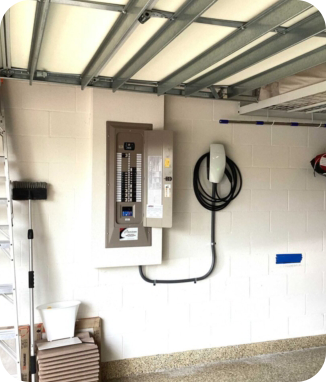EV CAR CHARGER SERVICES
PROFESSIONAL EV CAR CHARGER SERVICES
Looking to install an EV charging station at your home or business? At Bryan Hindman Electric, we’ve helped many customers do just that—safely, efficiently, and with the setup that fits their specific needs. Our electricians know exactly what to look for, and we make sure the process is smooth from start to finish. The result? A reliable, easy-to-use charging station that keeps your EV ready to go—whenever you need it.

WE OFFER MULTIPLE EV CAR
CHARGING SERVICES, INCLUDING:
Plug-In Chargers
A common EV outlet setup is a NEMA 14-50, requiring a dedicated 30-50 amp breaker. Use proper wire gauge (e.g., 8-gauge for 40 amps) and conduit if needed. Grounding is essential, and GFCI protection may be required by local codes.
Hard-Wired Chargers
Hardwired EV chargers need direct wiring into the electrical system, requiring a dedicated circuit with the correct breaker size and wiring. Grounding is essential for safety, and GFCI protection may be needed. Most Level 2 chargers operate at 240 volts and should match the circuit's amperage capacity.
Permits & Inspections
Permits are typically required for EV charger installation. After installation, a local inspector must approve the work to ensure it meets safety codes. Using a licensed electrician ensures that the work adheres to NEC and local codes.
UNDERSTANDING YOUR EV CAR CHARGER INSTALLATION PROCESS
Complimentary Consultation: Schedule a free consultation to assess your needs and determine the optimal charger location.
Customized Installation Plan: We will create a tailored installation plan, including necessary permits and tips for charger selection.
Professional Installation: We will complete your installation with expert precision, ensuring safe and correct wiring and connections.
FREQUENTLY ASKED QUESTIONS
-
Level 2 chargers are recommended for regular home charging. You can choose to install a GFCI-protected outlet or have the charger hardwired. The benefits of each option can be discussed during your consultation.
To learn more read our blog post Hardwired or Plug-In EV Chargers for My Home.
-
Installation time varies significantly based on specific needs and location. It can range from as little as two hours to a full day. Your electrician will provide a more accurate timeframe during the initial consultation.
-
Yes, consulting with an electrician ensures a safe, efficient, and code-compliant installation. During the consultation, we can assist with:
1. Electrical Panel Check: Ensure the panel has sufficient capacity and available slots.
2. Circuit Requirements: Recommend appropriate breaker size and wiring.
3. Location Evaluation: Suggest convenient, accessible locations close to the panel.
4. Environmental and Safety Factors: Address weather protection, ventilation, grounding, and GFCI needs.
5. Structural Support: Determine the best mounting options and check for structural support.
6. Future Needs: Plan for potential upgrades or additional EVs.
7. Code Compliance: Ensure installation meets local codes and obtain necessary permits.
8. Cost and Timeline: Provide a cost estimate and timeline for the installation. -
Absolutely! In fact, it's so important that starting in 2025, the National Electrical Codes will mandate the installation of a surge protector on all electric vehicle chargers.
-
A Level 2 Charger, our most common service, generally requires:
• Electrical Panel: 200-amp service with an available slot.
• Circuit Breaker: 50-amp breaker.
• Wiring: 6-gauge wire run in conduit as needed.
• Outlet: NEMA 14-50 outlet with GFCI protection (not required if hard-wired)
• Permits: Obtain necessary permits and schedule an inspection. -
Prices for EV charger installation range from $780 to $1200, or higher in some cases. The typical installation costs around $1100. The price varies based upon factors like the charger type, whether panel upgrades are needed, wiring distance, and additional features. Our price includes permit fees and coordination of required county inspections after completion of your installation. We provide complimentary quotes, during which time we can evaluate your current system, determine your needs, and give you an exact quote for your project.
NOW OFFERING FLEXIBLE FINANCING
Fast and easy application, applying does not impact your credit, no hidden fees or penalties.
